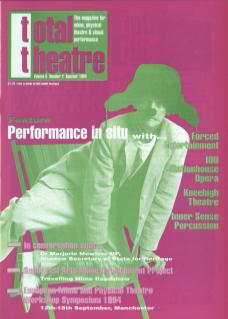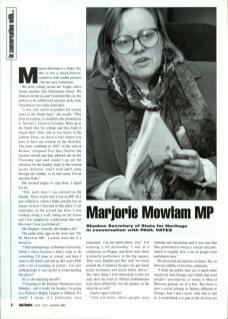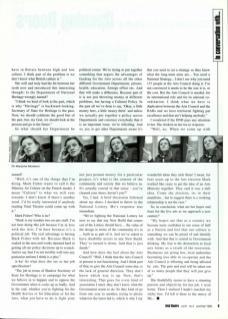Majorie Mowlam is a fluke! No, this is not a shock-horror exclusive with sordid pictures – but her own confession. We were sitting inside her bright office inside Number One Parliament Street. We chatted, drank tea and I watched Mo (as she prefers to be called) tuck into her sticky bun. I decided to save mine until later.
‘I was very active in politics for twenty years in the North East,’ she recalls. ‘Was born in London, in Southall [she pronounces it ‘Sar-forl’]. Lived in Coventry. Went up to the North East for college and then kind of stayed there. Erm, and as you know, in the Labour Party, we have a rule where you have to have one woman on the shortlist. The male candidate in 1987, in the seat of Redcar, resigned five days before the election started and they phoned me on the Thursday and said could I go on the selection for the Sunday night as the woman on the shortlist. And I went and I came through the middle, so in that sense I'm an absolute fluke.’
She seemed happy to stop there. I urged her on. ‘Yeah, well, then I was elected on the Sunday. Three weeks later I was an MP! So I just walked in, which I think actually has an impact on how I function in this place. I can remember on the second day here, I was walking along a wall, eating an ice cream and I was stopped by a policeman who said this wasn't how you behaved.’
She laughed. Actually, she laughs a lot!
The polite little sign on her door says ‘Dr. M. Mowlam MP’. I asked what she is a doctor in.
‘I did anthropology at Durham University, which I chose because I didn't want to do something I'd done at school, and then I went to the States and did an MA and a PhD with a lot of teaching in politics. I'm sure anthropology is very useful in understanding this place!’
So, is she enjoying herself?
‘I'm going to the Donmar Warehouse next Monday – call it work! On Sunday I'm going to a Women's Rugby League in Oldham. It's work! I mean, it's politically very important. I'm not particularly arty. I'm learning a lot personally. I was at a conference in Prague, and there were these wonderful performers in the big square. They were English and they said we travel around the Continent because we get much better treatment and much better shows. The other thing I find interesting is that not only does the kind of official establishment treat them differently, but the punters in the street do as well.’
I had to agree with her.
‘And you know, there, people were chatting and interacting and it was just that [the performers] weren't social outcasts, which is roughly how a lot of people treat performers here.’
We discussed perceptions of mime. Mo, in between nibbles of her bun, continued.
‘I think the public here see it much more negatively than Europe and I think that most people's perceptions of mime is Marcel Marceau getting out of a box. But there is also a social attitude in Britain different to Europe. And I don't know what that is due to. I would think it is part of the division we have in Britain between high and low culture. I think part of the problem is we don't know what British culture is.’
She well and truly had the bit between her teeth now and introduced this interesting thought: is the Department of National Heritage wrongly named?
‘I think we kind of look to the past, which is why "Heritage" is backward-looking – Secretary of State for Heritage is the past. Now, we should celebrate the good bits of the past, but, my God, we should look at the present and go to the future.’
So what should her Department be named?
‘Well, it's one of the things that I'm doing. Mark Fisher wants to call it the Ministry for Culture on the French model. I mean "Culture" is what we will veer towards. I don't know if there's another word. I'd be really interested if anybody reading Total Theatre could come up with it.’
Mark Fisher? Who is he?
‘Mark is my number two on arts stuff. I'm not here doing this job because I'm in love with the Arts. I'm here because it's a political job. The real advantage is having Mark Fisher with me. Because Mark is soaked in the area and works damned hard in getting all our policy decisions up to scratch. And to say that I'm not terribly well into any particular artform I think is a plus.’
A-ha! So what does she see as her job specification?
‘The job in terms of Shadow Secretary of State for Heritage is to campaign for what we believe in to happen and to oppose the Government when it cocks up so badly. And in the end, whether you're fighting for the Health Service or for Education or for the Arts, what you have to do is fight your political comer. We're trying to put together something that argues the advantages of funding for the Arts across all the other different Government Departments: prisons, health, education, foreign office, etc. And that will make a difference. Because part of it is not just throwing money at different problems, but having a Cultural Policy. In the past all we've done is say, “Okay, a little money here, a little money there” and unless we actually put together a policy across Departments and convince everybody that it is an important issue, we're whistling. And so, yes, to get other Departments aware it's not just peanut money for a particular project, it's what is the cement of the community and society that we believe in. It's actually crucial in that sense – you've cleaned your shoes, haven't you?’
Yes, I had. A brief discussion followed about my shoes. I decided to throw in the National Lottery. Mo's response was immediate.
‘We're fighting the National Lottery lot now to say that any New Build that comes out of the Lottery should have... the value of the design in terms of the community it's in... built in as part of it. And we've asked to have disability access in any New Build. They've turned it down. And that is just dumb.’
And how does she feel about the Arts Council? ‘Well, I think that the Arts Council at present is not functioning. And I think part of that, to give the Arts Council some due, is the lack of general direction. They don't know which way is up. Now, that's interesting. That goes for every kind of association I meet, they don't know what the Government wants to do. So they kind of go from one year to another, trying to please whatever the latest fad is, which is why I say that you need to set a strategy so they know what the long-term aims are... You need a National Strategy... I don't see why you need 137 people at the Arts Council doing it. I'm not convinced it needs to be the size it is, or the cost. But the Arts Council is needed, for its international role and for its national coordination. I think what we have is duplication between the Arts Council and the RABs and we have territorial fighting par excellence and that ain't helping anybody.’
I wondered if the DNH pays any attention to her. She choked on her tea in response.
‘Well, no. When we come up with wonderful ideas they nick them! I mean, for four years up to the last election Mark worked like crazy to get the idea of an Arts Ministry together. They said it was a daft idea. Come the election, its in their manifesto... but to suggest there is a working relationship is not the case.’
So, in conclusion, what are her hopes and fears for the live arts as we approach a new century?
‘My hopes are that as a country we become more confident in our sense of Self as a Nation and feel that our culture is something we can be proud of and identify with. And that that is central to Government thinking. My fear is the destruction to local arts forms as a result of the recession. Businesses are giving less, local authorities becoming less able to cooperate, and the Arts Council is effecting and being affected by cuts. The guts and soul will be taken out of so many people that they will just give up.’
She thankfully seems to have a stunning passion and objectivity for her job. I went home. Then I realised I hadn't touched my sticky bun. I'd left it there to the mercy of Mo…


